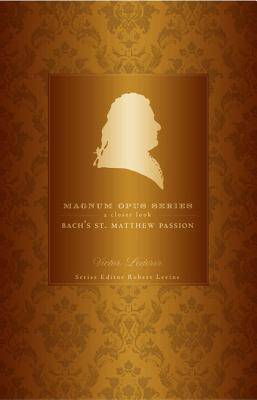
- Retrait gratuit dans votre magasin Club
- 7.000.000 titres dans notre catalogue
- Payer en toute sécurité
- Toujours un magasin près de chez vous
- Retrait gratuit dans votre magasin Club
- 7.000.0000 titres dans notre catalogue
- Payer en toute sécurité
- Toujours un magasin près de chez vous
33,45 €
+ 66 points
Description
Johann Sebastian Bach's the St. Matthew Passion stands as a singular expression of religious sensibility. First performed in 1727, and conceived within the constraints of Bach's role as cantor of the St. Thomas Church in the provincial German city of Leipzig, the music has a power and profundity that readily transcend time and place. Yet the darkness of the subject - the betrayal, trial, and crucifixion of Jesus - and the complexity and sophistication of Bach's compositional techniques can make the St. Matthew Passion difficult listening for even the most eager novice. By highlighting the inspiration Bach drew from opera, this book truly illuminates the hybrid forms that comprise the work, thereby clarifying many of the composer's dramatic strategies. Drawn from the Gospel of St. Matthew, the narrative sections - featuring characters including the narrator-Evangelist, Pilate, Peter, Judas, and Jesus himself - have tremendous theatrical power, while non-Biblical arias and chorales offer moments of deep reflection and consolation. St. Matthew Passion shows the willing but intimidated beginner the way into the intricacies of Bach's masterwork while unveiling subtleties for the more knowledgeable listener as well. Finally, Lederer recounts the fascinating performance history of the St. Matthew Passion and looks at the merits of different recordings of this extraordinary work, indisputably one of the cornerstones of western music.
Spécifications
Parties prenantes
- Auteur(s) :
- Editeur:
Contenu
- Nombre de pages :
- 144
- Langue:
- Anglais
- Collection :
Caractéristiques
- EAN:
- 9780826429407
- Date de parution :
- 01-12-08
- Format:
- Livre broché
- Format numérique:
- Trade paperback (VS)
- Dimensions :
- 134 mm x 199 mm
- Poids :
- 163 g

Les avis
Nous publions uniquement les avis qui respectent les conditions requises. Consultez nos conditions pour les avis.






